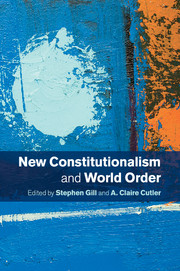Book contents
- Frontmatter
- Contents
- List of Figures
- List of Contributors
- Acknowledgements
- List of Acronyms
- 1 New constitutionalism and world order
- Part I Concepts
- Part II Genealogy, origins and world order
- Part III Multilevel governance and neo-liberalization
- Part IV Trade, investment and taxation
- 10 How to govern differently
- 11 Trade agreements, the new constitutionalism and public services
- 12 New constitutionalism, international taxation and crisis
- Part V Social reproduction, welfare and ecology
- Part VI Globalization from below and prospects for a just new constitutionalism
- Glossary
- Appendix
- Bibliography
- Index
12 - New constitutionalism, international taxation and crisis
from Part IV - Trade, investment and taxation
Published online by Cambridge University Press: 05 February 2014
- Frontmatter
- Contents
- List of Figures
- List of Contributors
- Acknowledgements
- List of Acronyms
- 1 New constitutionalism and world order
- Part I Concepts
- Part II Genealogy, origins and world order
- Part III Multilevel governance and neo-liberalization
- Part IV Trade, investment and taxation
- 10 How to govern differently
- 11 Trade agreements, the new constitutionalism and public services
- 12 New constitutionalism, international taxation and crisis
- Part V Social reproduction, welfare and ecology
- Part VI Globalization from below and prospects for a just new constitutionalism
- Glossary
- Appendix
- Bibliography
- Index
Summary
Introduction: new constitutionalism and taxation
This chapter explores how the global financial crisis of 2008–9 has affected the stability of the ‘new constitutionalism of disciplinary neo-liberalism’ in the realm of international tax policy. New constitutionalism forms a principal institutional component of neo-liberal hegemony. In neo-Gramscian international political economy, neo-liberalism is understood as a political project aimed at restoring capitalist class power after the economic and social crisis of the 1970s (Harvey 2005; van Apeldoorn and Overbeek 2012). This project is undergirded by dialectically intertwined material, ideational and institutional components. In the material realm, the structural power of transnational capital is manifested by the predominance of international finance and transnational corporations in the global political economy. The cross-border mobility of these fractions and the associated ‘exit option’ discipline governments, parliaments and national trade unions to introduce and accept neo-liberal economic policies. Ideationally, neo-liberalism is characterized by the hegemony of pro-market, supply-side and monetarist discourses (van Apeldoorn and Overbeek 2012). However, militant neo-liberalism has to a certain extent been succeeded by the seemingly more politically ‘neutral’ globalization discourse, which pretends that states have lost a considerable deal of their actual sovereignty and that for nations there is no alternative (TINA) to adjusting to the exigencies of internationally mobile capital.
In the institutional sphere, new constitutionalism firmly institutionalizes neo-liberal globalization. Stephen Gill (2008) defines new constitutionalism as the political project designed to anchor neo-liberal policies into national and international legal frameworks, insulating these policies from normal, day-to-day democratic debate and decision-making. As Gill has stated, the central goal of new constitutionalism is to firmly secure the protection of private property rights, and as such to transform public policy in the interests of mobile capital. What is emerging is a social order in which holders of that capital are conferred privileged rights of citizenship and representation, and in which these rights are ‘locked in’. In effect, ‘the mobile investor becomes the sovereign political subject’ (1998b: 25). Consequently, dominant economic forces, in particular wealthy individuals, transnational corporations and financial institutions, are ‘increasingly insulated from democratic rule and popular accountability’ (ibid: 23), and, in the case examined here, from taxation.
- Type
- Chapter
- Information
- New Constitutionalism and World Order , pp. 197 - 210Publisher: Cambridge University PressPrint publication year: 2014
- 5
- Cited by



